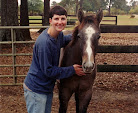Having been much in the company recently of someone who not only gives genuine positive feedback in abundance but also inspires other people to do likewise, I’m left to wonder why this isn’t a more common practice. Pat Parelli says that humans and dogs are motivated by praise, recognition, and material objects. Yet although two of those three have a huge effect on the receiver with little cost to the giver, they are not often in evidence. Why?
In part, I think that, for Type A personalities especially, it’s so much more a habit to focus on what still needs to be done instead of what has been accomplished. It’s also a constant challenge, as Parelli acknowledges, to “be particular without being critical.” But what a difference it makes when you can manage it! It's the key to so much--even to horses, who are not themselves silly enough to care much for such abstractions as praise and recognition. They do care, though, that you don't just keep hounding them in your quest for perfection (which they are also intelligent enough not to care about), and they certainly get that their lives have more of what they *do* care about (comfort and play) when their human is less critical.
For me, I can weigh how much power positive feedback has by the fact that I remember just about every instance of it that I have gotten during my training of Lupin in the past 9 years. Of course, my sensitivity to it was heightened early on by the fact that, before Lupin, I had never raised a horse from a foal, and I was completely paranoid that I was going to do something wrong and screw him up for life, with the possibility of dire consequences for both him and myself.
And then there’s the fact that having a small foal is a lot like being pregnant: everybody has a strong (and often different) idea about what you should be doing and how you should be doing it, and they’re more than happy to share. When you’re a little uncertain yourself (as I very much was since I was brand new to Parelli as well as to colt starting), it’s overwhelming.
So the instances in which an outsider just said to me, “Marian, you’ve done a really good job with him,” stand out like little oases in a vast desert of uncertainty and doubt about what I was doing. They were moments that allowed both Lupin and me to breathe a sigh of relief because, for a space, I took the pressure off him and just relaxed.
Parelli’s goal is for his students to be positive, progressive, and natural while using love, language, and leadership with their horses. None of this has come easily for me with Lupin. When he challenges my leadership, it’s difficult for me to hold on to the love, and all the abilities that love gives you: patience, and forgiveness, and strength. Learning the natural language of horses is a humbling experience that makes you realize how very little you know about horses, whether you’ve spent a lifetime with them or not, and being truly progressive requires a level of creativity and flexibility that I don’t even begin to have, but that I am beginning to work toward.
But for now, being positive begins to seem like the thing on which all the others hinge. It is the fulcrum on which to balance on one side the quest for excellence, which you can’t pursue without a positive goal, and on the other, the ability to appreciate what you and your horse have already achieved--without which you will never be able to genuinely acknowledge your horse’s “try’s.”




No comments:
Post a Comment